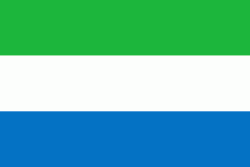Sierra Leonean leone
Le
The leone is the currency of Sierra Leone. It is subdivided into 100 cents. As of 1 July 2022, the ISO 4217 code is SLE due to a redenomination of the old leone (SLL) at a rate of SLL 1000 to SLE 1. The leone is abbreviated as Le placed before the amount.The leone was introduced on 4 August 1964. It replaced the British West African pound at a rate of 1 pound = 2 leones (i.e., 1 leone = 10 shillings). When it was introduced, one leone was worth precisely half a pound sterling or US$1.40. The leone was worth more than the U.S. dollar until the 1980s, when the currency started to devalue rapidly. Years of high inflation have caused the value of leone to plummet, and a U.S. dollar became worth thousands of leones starting in the 2000s.
In August 2021, it was announced that a new leone (SLE), worth 1000 SLL, would be introduced. The new leone was eventually introduced in July 2022. Old leone denominations remain legal tender and continue to circulate.
Inflation continues to erode the purchasing power of the leone, averaging over 20% a year. , one U.S. dollar was valued at 16.50 SLE or 16,500 SLL, making the 20 SLE note (the highest circulating denomination) worth only US$1.21.
Country
-
Sierra Leone
Sierra Leone, officially the Republic of Sierra Leone, is a country on the southwest coast of West Africa. It shares its southeastern border with Liberia, and the northern half is surrounded by Guinea. Covering a total area of 71740 km2, it has a tropical climate, with environments ranging from savanna to rainforests. It has a population of 7,092,113 as of the 2015 census. Freetown is the capital and largest city. The country is divided into five administrative regions, which are subdivided into 16 districts.
It is a constitutional republic with a unicameral parliament and a directly elected president serving a five-year term with a maximum of two terms. It is a secular nation with the constitution providing for the separation of state and religion and freedom of conscience (which includes freedom of thoughts and religion). Muslims make up about three-quarters of the population, with a Christian minority.
